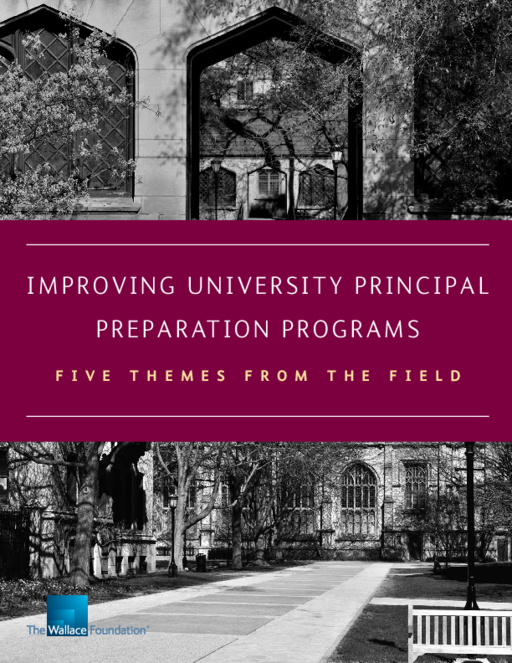- Author(s)
- Jacquelyn Davis
- Publisher(s)
- The Wallace Foundation
Research Approach
This synthesis publication draws from four reports written in August and September 2015 by the American Association of Colleges for Teacher Education, The School Superintendents Association, the American Institutes for Research, and the University Council for Educational Administration at the request of The Wallace Foundation. These four reports informed a Wallace initiative aimed at improving university principal preparation.
American Association of Colleges for Teacher Education (AACTE )
AACTE is a national alliance of university-based educator preparation programs dedicated to high-quality, evidence-based preparation. AACTE issued a survey to its 842 member institutions to gain insight into university-based preparation programs, the context in which they operate, the degree to which various program elements are seen as important, the implementation of these program elements, and the challenges programs face. A total of 255 surveys were completed sufficiently for data analysis, yielding a high, 30 percent response rate. Most of the respondents were university faculty members, deans, or department chairs. Eighty-three percent of respondents have active principal preparation programs.
The School Superintendents Association (AASA)
AASA is a membership association for school system superintendents. AASA sent a survey to 10,340 superintendents to determine their viewpoints on existing conditions for preparing, licensing, and employing school principals. Their perceptions are critical not only because superintendents employ and often supervise principals but also because many superintendents have themselves been principals. A total of 408 respondents from 42 states completed the survey. Additionally, AASA held two focus groups in July 2015 with more than 135 superintendents and executive directors of state superintendent associations, bringing in additional input.
American Institutes for Research (AIR)
AIR is a nonprofit research and technical assistance firm. AIR collected and analyzed data with the goal of identifying states with the highest prevalence of indicators that experts believe create conditions amenable to fostering high-quality principal preparation programs. Its analysis was based on reviews of literature, interviews with experts, and a state-by-state policy scan to locate policy levers conducive to high-quality principal preparation programs.
University Council for Educational Administration (UCEA)
UCEA is a consortium of higher education institutions committed to advancing the preparation and practice of education leaders. UCEA applicants are required to undergo a quality screen for membership. UCEA analyzed data on programs from its INSPIRE survey, used for program evaluation, and what it called an “interest and capacity” survey on program redesign. Both surveys were completed by 59 out of 97 UCEA member institutions (a 60 percent response rate). UCEA’s goal was to identify programs in two categories: 1) those with an interest in and the capacity to engage in redesign, and 2) those that could serve as exemplars for others across the United States to support redesign. UCEA looked at key program features as well as contextual factors, such as university and state environments, that would support or hinder a preparation program in undergoing a redesign. It also conducted a state-level analysis, similar to AIR’s work, to identify state rules and regulations that promote research-based practices identified as high-leverage policies for high-quality principal preparation and certification.

